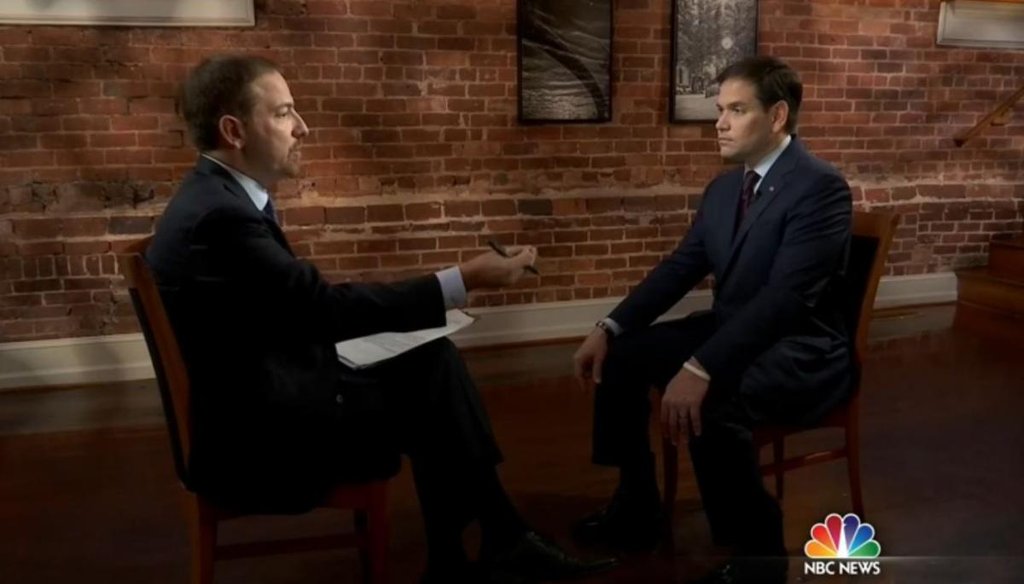Get PolitiFact in your inbox.

GOP presidential candidate Marco Rubio answers questions from NBC's Chuck Todd in an interview that aired Dec. 13, 2015, on "Meet the Press." (Screenshot)
Sen. Marco Rubio, R-Fla., dismissed Donald Trump’s proposed Muslim ban as an attempt to "recapture the limelight after having lost it," then pivoted to a harsher critique of President Barack Obama.
"But he is reminding us in that process that people are really upset and they're really scared," Rubio said of Trump Sunday on NBC’s Meet the Press. "And they're worried. And I think the president made things worse last Sunday with his speech, not better."
Rubio said he would build a coalition of primarily Sunni Arab countries to fight ISIS, which host Chuck Todd pointed out sounded a lot like the White House’s current coalition of roughly 60 countries.
"Listen, I mean, there's three or four countries that are providing military force," Rubio said in a part of the interview posted on NBCNews.com. "And the rest are signed on on paper but are not contributing significantly to the cause. The truth is the most important countries that need to be contributing, including men on the ground to fight, Egypt, Saudi Arabia, the UAE, Jordan, other Gulf kingdoms, are not."
Rubio’s claim rates Mostly True.
Data compiled by a group called Airwars.org, which tracks the international air war against ISIS using information released by the U.S. military and other sources, show the United States has been doing the vast majority of operations against ISIS in Syria and the lion’s share in Iraq. In the most recent month, other allies have accounted for just 6 percent of the airstrikes in Syria and 30 percent in Iraq.
Such data is consistent with Rubio’s statement, though determining the exact number of U.S. allies taking a significant role in "providing military force" is tricky due to a lack of transparency among some of the countries that belong to the coalition. The Pentagon only publicly breaks down the data into U.S. and non-U.S. strikes in Syria and Iraq — not further by individual nation.
The non-U.S. countries with the best case for having taken a "serious" role in the air war include France, the United Kingdom, the Netherlands and Australia, said David Weinberg, a senior fellow at the Foundation for Defense of Democracies.
According to his research, each has conducted more than 1,000 sorties against ISIS or conducted several hundred airstrikes. Most of these have been in Iraq rather than Syria, he said.
The only additional countries that might qualify for this most-active category are Canada and Turkey, but both of these countries come with asterisks. In Canada, the newly elected government of Prime Minister Justin Trudeau pledged during the campaign to terminate its involvement in anti-ISIS airstrikes, though it’s unclear whether that phase-down has been fully carried out. As for Turkey, it has been launching a large number of airstrikes in Syria since the summer, but many of those were against Kurdish rebels and not against the Islamic State, Weinberg said.
Chris Woods, the director of Airwars.org, cautioned that some other members of the broader coalition, including some with only modest militaries, have been providing auxiliary assistance that may technically fall beyond Rubio’s definition but are nonetheless valuable to U.S. interests.
"Italy provides vital in-air refueling for strike aircraft, for example, while Germany has just committed six Tornados for valuable aerial reconnaissance," Woods said. "At sea, the Belgians are helping protect the French carrier Charles de Gaulle. And on the ground, a significant number of nations, such as New Zealand and Portugal, are helping train Iraqi forces."
Who defines marriage
In addition to terrorism, Todd asked Rubio if he would work to overturn the Supreme Court’s ruling legalizing same-sex marriage across the country in June if he is elected president. Rubio said he would appoint Supreme Court justices who "will interpret the Constitution as originally constructed" and may reverse the decision.
"If you want to change the definition of marriage, then you need to go to state legislatures and get them to change it because states have always defined marriage," he said. "And that's why some people get married in Las Vegas by an Elvis impersonator. And in Florida, you have to wait a couple days when you get your permit. Every state has different marriage laws."
Has marriage always been defined by the states? We rate this Half True.
Rubio has a point that marriage laws are largely the states' responsibility, such as the permit and license laws he noted. But states cannot make laws that violate the Constitution, and the June ruling legalizing same-sex marriage was not the first time the Supreme Court limited state regulation and, essentially, defined marriage.
The most pertinent example is the 1967 Supreme Court decision in Loving vs. Virginia, which invalidated any bans on interracial marriages. The court decided unanimously that these bans violated the equal protection clause of the 14th Amendment.
There are a few more examples of the Supreme Court overturning state marriage laws on 14th Amendment grounds.
In 1971’s Boddie vs. Connecticut, the court found a Connecticut law requiring poor people to pay a fee to get divorced violated the due process clause of the 14th Amendment. Seven years later, in Zablocki vs. Redhail, the court overturned a Wisconsin statute barring fathers who were behind on child support payments from getting married. And in Turner vs. Safley, the court in 1987 said a Missouri statute barring inmates from getting married was unconstitutional.
"There is no unrestricted prerogative of a state to do whatever it wishes with respect to marriage, Constitution be damned," said Jane Schacter, a Stanford University constitutional law professor. "But it is always case by case."
Our Sources
See fact-checks.


















































